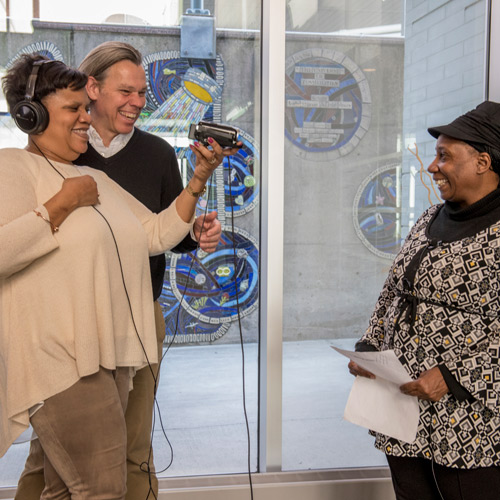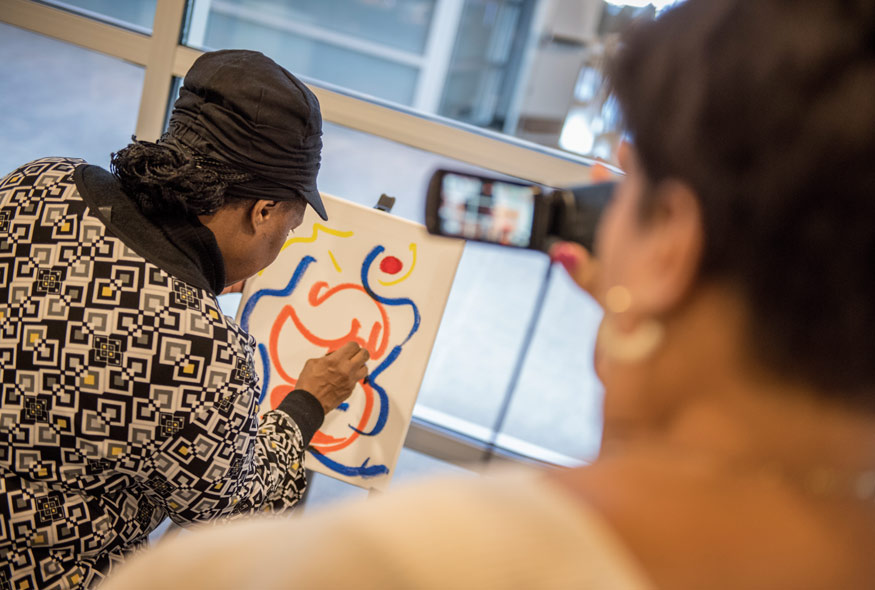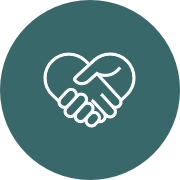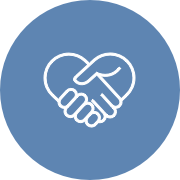
Recovery Diaries
A production meeting broke out suddenly as Sheila and Brenda discussed how to begin filming the next segment of their documentary. Glenn Holsten, the award-winning documentary filmmaker, listened to the discussion in the WHYY studio and said: “Well, that’s the process — it’s all about the choices you want to make. It’s your choice.”
Sheila Hall-Prioleau is the director of RHD United Peers, which supports people in recovery from mental health challenges in a community inclusion program staffed by Certified Peer Specialists. Brenda Lewis began as a member of United Peers, gained her CPS certification and is now a WRAP (Wellness Recovery Action Plan) facilitator. Their biggest choice was the decision to tell their story as part of the OC87 Recovery Diaries series, which features stories of mental health recovery created by and for people who are still on their journeys. When they were accepted into the program at WHYY, Sheila and Brenda learned filmmaking and editing so they could tell their story themselves.
“When I first sat down in front of the editing board, it looked like Greek,” Sheila said. “I thought, oh my gosh, what have I got myself into? The only experience I had was taking pictures on my phone! It was fun after we learned it, but it was scary.”
Holsten and WHYY Youth Media Instructor Sarah Milinski lent their support in helping Sheila and Brenda tell their story, but their touch in the film is very light. Sheila and Brenda got technical assistance and some basic filmmaking instruction, but the documentary that will tell the story of Brenda’s journey of trauma and recovery at United Peers is all theirs.
“In the beginning, I was really scared,” Brenda said. “There’s so much I could talk about — trauma, Post-Traumatic Stress Disorder, abuse … and it’s like: Are you sure? And the answer was: Yes, say it, talk about it. It’s freeing.
“I never walked in and felt: I got this. But I always felt I was learning and I was growing. I loved walking in every day and saying: Teach me something. It was a great, great experience. It was fun.”
United Peers uses Certified Peer Specialists to assist persons in recovery as they work to live as independently as possible, demonstrating and modeling recovery through education and their own lived experiences.

United Peers grew out of RHD’s commitment to using Certified Peer Specialists in its programs. At RHD, Certified Peer Specialist is a credential, not a job description. It is a professional role that is transforming RHD behavioral health services. RHD maintains the integrity of the Peer Support model with full-time Peer Specialist Coordinators responsible for providing technical assistance and support.
RHD works to develop the roles and responsibilities of Peers in direct services, being mindful of the variety of skills Peers possess and the career trajectory of a Peer workforce. Brenda’s story not only shows the impact of peer support, it made for exciting — and occasionally cathartic — filmmaking.
Brenda coped with trauma through art. When she completed a piece, she would put it away — and avoided looking at it again. But for this film, she brought out a number of pieces and hung them on a wall. On film, she talked about each piece, what it meant and why she did it.
“It was the first time I’d looked at them in years,” Brenda said. “I was so scared. But when I did it, it felt like a weight just fell off my shoulders.”
“Watching her has been amazing,” Sheila said. “It hasn’t been easy, but to see her get through it, no matter what, has given me encouragement.
“We tell our members all the time: You can do anything you want. I wanted her to be able to see what I see. If she sees it on film, she’ll know how awesome she is.”
Their film debuts this summer. And then, as Brenda said, “Once you do this, it’s out there. There’s no taking it back.”
“I hope people take away that if Brenda can do it, so can I,” Sheila said. “And that I am not my diagnosis. PTSD doesn’t have to make me a victim; I can still be a survivor.”
Brenda said she hopes her story inspires others.
“I was someone people gave up on and said there was no hope for me, but at United Peers, my whole life has changed,” Brenda said. “I’ve still got difficult situations going on, but I’ve learned I can do anything. RHD advocates for us, and Sheila really cares about us. If people support you and want you to prosper, you can.”


